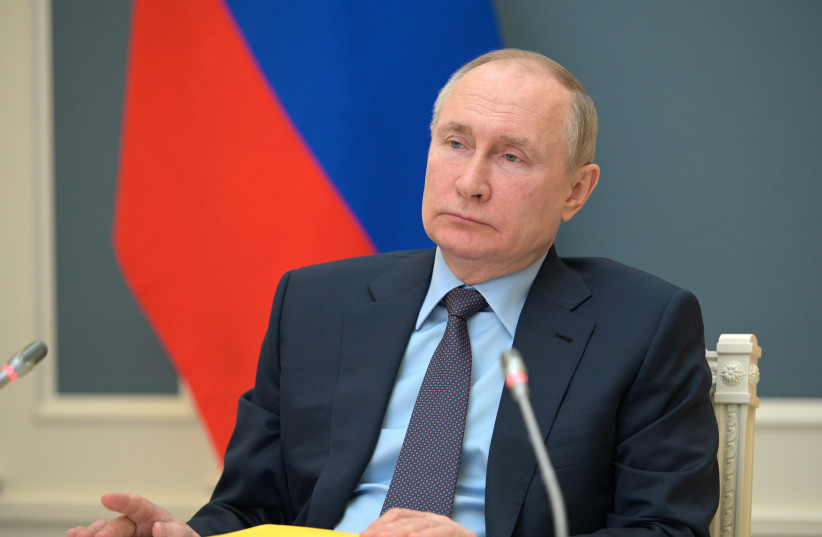The United States will announce the first of what could be multiple levels of new sanctions and export controls against Russia on Tuesday in response to Moscow's decision to recognize two breakaway regions of Ukraine as independent and send troops there.
Reuters could not determine what sanctions or export controls might be announced, but the Biden administration has prepared an initial package that includes barring US financial institutions from processing transactions for major Russian banks, people familiar with the matter said over the weekend.
On Monday a senior administration official said Russia's sending troops to the breakaway regions of Ukraine did not represent a further invasion because Russia had had troops there previously. But on Tuesday, deputy national security adviser Jonathan Finer said an invasion had begun.
"We think this is, yes, the beginning of an invasion, Russia's latest invasion of Ukraine," Finer said on CNN. "For the third or fourth time, I am calling it an invasion. We are taking a severe response, including sanctions on Russia that we'll be rolling out in a matter of hours," he said.
Finer said the United States had envisioned multiple levels of sanctions based on Russia's actions.

"That has been our approach all along. We envisioned waves of sanctions that we would roll out on Russia if and as it continues to take steps down the path for toward war, which we believe that they' are doing."
The measures aim to hurt the Russian economy by cutting the "correspondent" banking relationships between targeted Russian banks and US banks that enable international payments.
The United States could also wield its most powerful sanctioning tool against certain Russian people and companies by placing them on the Specially Designated Nationals list, effectively kicking them out of the US banking system, banning them from trading with Americans and freezing their US assets, the same sources said.
European Union foreign ministers agreed on Tuesday to sanction 27 Russians and entities after Moscow recognized two breakaway regions in eastern Ukraine, as well banks, the defense sector and limiting Russian access to European capital markets.
All members of Russia's Duma, parliament's lower house, will be hit with EU sanctions, which typically involve travel bans and asset freezes.
"This package of sanctions that has been approved by unanimity by the member states will hurt Russia, and it will hurt a lot," EU foreign policy chief Josep Borrell told a news conference alongside France's foreign minister at a meeting in Paris.
Meanwhile, Britain slapped sanctions on Gennady Timchenko and two other billionaires with close links to Vladimir Putin after the Kremlin chief ordered the deployment of troops to two breakaway regions in eastern Ukraine.
British Prime Minister Boris Johnson said Russia was heading towards "pariah status" and that the world must now brace for the next stage of Putin's plan, saying that the Kremlin was laying the ground for a full-scale invasion of Ukraine.
Johnson told parliament that five banks - Rossiya, IS Bank, GenBank, Promsvyazbank and the Black Sea Bank - were being sanctioned, along with three people - Timchenko, Igor Rotenberg and Boris Rotenberg.
But Johnson refrained from imposing limits on Russia's biggest state banks, cutting off capital for Russian companies or ejecting other prominent so-called Russian oligarchs from Britain.
"This is the first tranche, the first barrage of what we are prepared to do," Johnson said.
"Any assets they hold in the UK will be frozen and the individuals concerned will be banned from traveling here," Johnson said of the individuals being sanctioned.
Some British lawmakers asked Johnson to be tougher on Russian money, even demanding that Russian oligarchs be ejected from Britain and Russian money be dug out of the City of London.
Hundreds of billions of dollars have flowed into London and Britain's overseas territories from Russia since the fall of the Soviet Union in 1991, and London has become the Western city of choice for the super-wealthy of Russia and other former Soviet republics.
Britain has threatened to cut off Russian companies' access to U.S. dollars and British pounds, blocking them from raising capital in London and exposing what Johnson calls the "Russian doll" of property and company ownership.
<a href="https://www.jpost.com/breaking-news/article-698200">PUTIN</a>'S CIRCLE
Though Johnson put Putin on warning that more sanctions would follow, Britain's initial sanctions package goes little further than the United States which in 2014 sanctioned Timchenko and the Rotenbergs.
Britain said that Timchenko, one of the founders of Gunvor trading company, was a major shareholder in Bank Rossiya, itself a stakeholder in National Media Group which supported the destabilization of Ukraine after Russia's 2014 annexation of Crimea.
"Bank Rossiya has supported the consolidation of Crimea into the Russian Federation by integrating the financial system following the annexation of Crimea," Britain said.
Timchenko, who Forbes says is worth $23.5 billion, is a close ally of Russian President Putin, as are the Rotenbergs, Johnson said.
Johnson said Europe had failed to wean itself off Russian energy and saluted Chancellor Olaf Scholz's decision to halt the Nord Stream 2 pipeline.
Former Conservative Party leader Iain Duncan Smith asked Johnson to go further on sanctions, and cautioned that China would be watching the West's response carefully.
"They need to feel the pain of the first part of this decision," Duncan Smith said. "China will watch this and look at Taiwan."
"We must now brace ourselves for the next possible stages of Putin's plan," Johnson said. "Putin is establishing the pretext for a full scale offensive."
Russia's once mighty superpower economy is now smaller than Italy's based on IMF data, with a nominal GDP of around $1.7 trillion.
